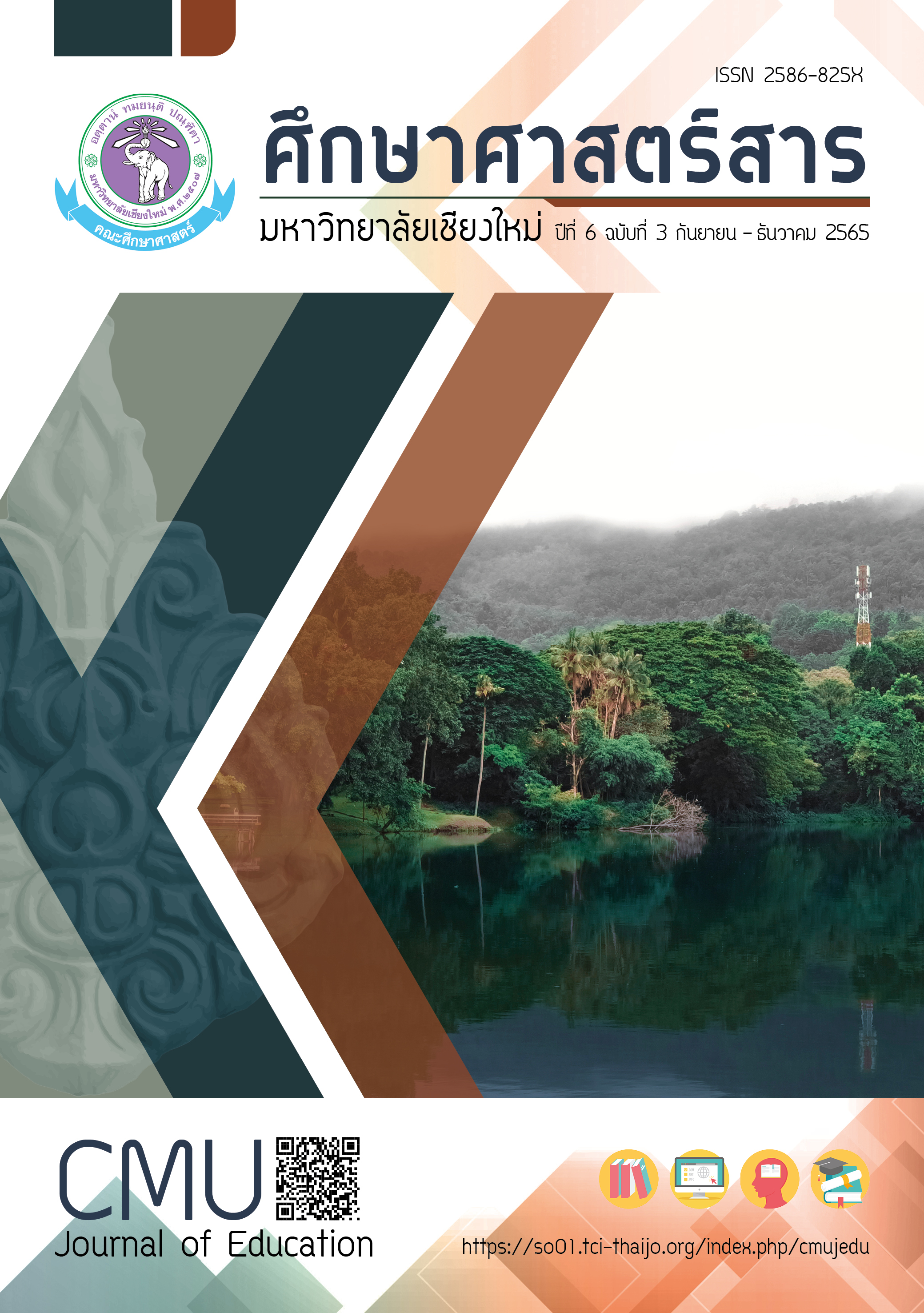จากการเรียนเพื่ออ่านสู่การอ่านเพื่อเรียนรู้: วิธีสอนทักษะการอ่านภาษาอังกฤษเป็นภาษาต่างประเทศ
Main Article Content
บทคัดย่อ
ความฉลาดรู้ด้านการอ่านมีความสำคัญต่อความเป็นพลเมืองโลกในสภาพแวดล้อมแห่งการเรียนรู้ในศตวรรษที่ 21 เนื่องจากการอ่านมีส่วนช่วยในการพัฒนาตนเองและทำให้ประสบความสำเร็จในชีวิต น่าเสียดายที่นักศึกษาไทยยังคงประสบปัญหาในการอ่านภาษาอังกฤษ บทความวิชาการนี้มีวัตถุประสงค์เพื่อเสนอแนะแนวทางการจัดการเรียนการสอนทักษะอ่านภาษาอังกฤษเป็นภาษาต่างประเทศโดยมีข้อมูลสนับสนุนจากงานวิจัยโดยเริ่มจากการคัดเลือกบทอ่านเพื่อนำมาใช้ในการเรียนการสอน การจัดลำดับขั้นตอนในการสอนการอ่านเชิงลึกซึ่งประกอบไปด้วย กิจกรรมในขั้นเตรียมความพร้อมก่อนการอ่าน ขั้นปฏิบัติการอ่าน และขั้นหลังการอ่าน โดยในแต่ละขั้นนั้น ผู้เรียนที่ประสบปัญหาในการอ่านจะได้รับการถ่ายทอดกลยุทธ์การอ่านที่หลากหลายและมีประสิทธิภาพควบคู่กับการตระหนักรู้เชิงอภิปัญญาซึ่งเป็นวิธีที่จะช่วยให้ผู้เรียนสามารถควบคุมและกำกับตนเองในกระบวนการอ่านเพื่อความเข้าใจรวมถึงการมีปฏิสัมพันธ์กับบทอ่าน ด้วยกระบวนการดังกล่าวจะสามารถทำให้ผู้เรียนที่เคยประสบปัญหาในการอ่านบทอ่านภาษาอังกฤษกลายเป็นผู้เรียนที่รู้จักปรับใช้กลวิธีการอ่านเพื่อแก้ปัญหาที่เกิดขึ้นในขณะที่อ่านได้
Article Details

อนุญาตภายใต้เงื่อนไข Creative Commons Attribution-NonCommercial-NoDerivatives 4.0 International License.
หากผู้เสนอบทความมีความจำเป็นเร่งด่วนในการตีพิมพ์โปรดส่งลงตีพิมพ์ในวารสารฉบับอื่นแทน โดยกองบรรณาธิการจะไม่รับบทความหากผู้เสนอบทความไม่ปฏิบัติตามเงื่อนไขและขั้นตอนที่กำหนดอย่างเคร่งครัด ข้อมูลของเนื้อหาในบทความถือเป็นลิขสิทธิ์ของ Journal of Inclusive and Innovative Education คณะศึกษาศาสตร์ มหาวิทยาลัยเชียงใหม่
เอกสารอ้างอิง
ชไมภัค เตชัสอนันต์. (2564). จิตวิทยาการเรียนการสอนภาษาอังกฤษ. กรุงเทพฯ: สำนักพิมพ์จุฬาลงกรณ์มหาวิทยาลัย.
ณัฐพงษ์ พลหน่วยตระกูล. (2560). การจัดกิจกรรมการเรียนการสอนโดยใช้กลวิธีการเรียนรู้คำศัพท์เพื่อพัฒนาความรู้คำศัพท์และความสามารถในการอ่านภาษาอังกฤษของนักเรียนชั้นประถมศึกษาปีที่ 5 โรงเรียนหนองสิมโนนสวรรค์ สำนักงานเขตพื้นที่การศึกษาประถมศึกษาบึงกาฬ. ศึกษาศาสตร์สาร มหาวิทยาลัยเชียงใหม่, 1(3), 1-14.
ทรงธรรม อินทจักร. (2561). ภาษาอังกฤษในฐานะภาษาโลก. ปทุมธานี: โรงพิมพ์แห่งมหาวิทยาลัยธรรมศาสตร์.
พวงเพ็ญ อินทรประวัติ. (2562). การสอนเด็กให้อ่านภาษาอังกฤษให้คล่องโดยการอ่านประกอบการแสดงบนเวที. สิกขาวารสารศึกษาศาสตร์, 6 (1), 75-89.
สิรจิตต์ เดชอมรชัย และชนยา ด่านสวัสดิ์. (2560). กิจกรรมการเรียนรู้เพื่อส่งเสริมอภิปัญญาของผู้เรียนภาษาฝรั่งเศสระดับเริ่มต้น. วารสารมนุษยศาสตร์ มหาวิทยาลัยนเรศวร, 14 (3), 1-14.
อารีรักษ์ มีแจ้ง. (2558). การจัดการเรียนการสอนภาษาอังกฤษที่บูรณาการทักษะการอ่านและการเขียน. การจัดประสบการณ์การเรียนรู้ภาษาอังกฤษ หน่วยที่ 1-7. นนทบุรี: มหาวิทยาลัยสุโขทัยธรรมาธิราช.
Adunyarittigun, D. (2021). Metacognitive Awareness of Reading and Reading Strategy Use by Nonproficient College Readers. rEFLections, 28(1), 82-106.
Anderson, N.J. (1991). Individual differences in strategy use in second language reading and testing. The modern language journal, 75, 460-470.
Angosto, A., Sanchez, P. et al. (2013). Evidence for Top-Down Processing in Reading Comprehension of Children. Psicologia Educativa, 19, 83-88.
Berardo, S.A. (2006). The use of authentic materials in the teaching of reading. The Reading Matrix, 6(2), 60-69.
Bridges, L. (2014). The Joy and Power of Reading: A Summary of Research and Expert Opinion. Retrieved
from https://www.scholastic.com/worldofpossible/assets/readingresearch.pdf.
Brysbaert, M. (2019). How many words do we read per minute? A review and meta-analysis of reading rate.
Retrieved from https://doi.org/10.31234/osf.io/xynwg.
Carrell, P.L. & Eisterhold, J.C. (1985). Schema theory and ESL reading. TESOL Quarterly, 17(4), 553-573.
Chatkeaw, P., & Tachom, K. (2021). Improving Undergraduates’ Reading Comprehension and Order Thinking Skills through PSQ6R Method. Journal of SaengKhomKham Buddhist Studies, 6(3), 393 – 406.
Cowell, L.S. (2012). Pre-teaching Vocabulary to Improve Comprehension of a Narrative Text. A dissertation, Doctor of Philosophy, Auburn University.
Crystal, D. (2007). How language works: how babies babble, words change meaning, and languages live or die, USA: Avery Pub Group.
Dole, J.A., Duffy, G.G., Roehler, L.R., & Pearson, P.D. (1991). Moving from the Old to the New: Research on Reading Comprehension Instruction, Review of Educational Research, 61(2), 239-264.
Ghahroudi, M.R., & Sheikhzadeh, E. (2017). Selecting Reading Texts for University Iranian EFL Students, Journal of Advances in English Language Teaching, 5(3), 25-30.
Grabe, W., & Stoller, F.L. (2019). Teaching and Researching Reading (Third Edition). New York: Routledge.
Hedgcock, J.S., & Ferris, D.R. (2009). Teaching Readers of English: Students, Texts, and Contexts. New York: Routledge.
Ibnian, S.S. (2019). The Effect of Using the Flipped Learning Strategy on Developing University Students’ Reading Comprehension in EFL and their Attitudes towards the Strategy, Al-Manarah, 25(1), 437-458.
Jaisook, P. (2015). Extensive Reading: A Success in Reader Autonomy, Humanities and Social Sciences, 32(1), 147-164.
Jusuf, H. (2018). The Models of Checklist Method in Evaluating ELT Textbooks, Journal al-Lisan, 3(2), 17-35.
Kanoksilapatham, B. (2016). Promoting Global English while Forging Young Northeastern Thai Learners’ Identity. 3L: The Southeast Asian Journal of English Language Studies, 22(3), 127 – 140.
Kiili et al., (2018). Reading to Learn From Online Information: Modeling the Factor Structure. Journal of Literacy Research, 50(3), 304–334.
Kung, F.W. (2019). Teaching second language reading comprehension: the effects of classroom materials and reading strategy use. Innovation in Language Learning and Teaching, 13(1), 92-104.
Maher, R. (2020). 4 Reasons Why We Post Selfies. Retrieved from https://ryanmaher.net/4-reasons-why-we-post-selfies/.
Momtaz, E. (2012). An Empirical Study of the Effectiveness of Collaborative Reading in Tertiary Level EFL Teaching in Iran (Doctoral Dissertation, the University of Aberdeen). Retrieved from https://ethos.bl.uk/OrderDetails.do?uin=uk.bl.ethos.569593.
Mousavian, S., & Siahpoosh, H. (2018). The Effects of Vocabulary Pre-teaching and Pre-questioning on Intermediate Iranian EFL Learners’ Reading Comprehenstion Ability. International Journal of Applied Linguistics & English Literature, 7(2), 58-63.
Muchtar, N. (2019). Intensive and Extensive Reading in Improving Teaching Reading Comprehension. Lingua Pedagogia (Journal of English Teaching Studies), 1(2), 1-13.
Nath, P.K. (2021). The Effect of Planned Instruction on Metacognitive Awareness of Reading Strategies. LEARN Journal: Language Education and Acquisition Research Network, 14(2), 194-221.
Nordin, R., & Eng, L-S. (2017). Text-Selection for Teaching English to ESL Tertiary Students: A Study on Genre and Content Preferences. International Journal Instruction, 10(1), 71-84.
OECD. (2019). How does PISA define and measure reading literacy? Retrieved from https://www.oecdilibrary.org/docserver/efc4d0feen.pdf?expires=1612804563&id=id&accname=guest&checksum= 3EF8CACE748000A9F05C769D3BE73924.
Pantito, B. (2020). Development of Teaching Reading through Reading Strategies for Enhancing Learners Based Applied Linguistics. Mahachula Academic Journal, 7(2), 330-342.
Pokharel, P.K. (2018). Learning to Read and Reading to Learn in English. Journal of NELTA Surkhet, 5, 75-81.
Pho-Klang, K. (2020). Using news articles as authentic materials for EFL students. Liberal Arts Review, 15(1), 79-91.
Rashidi, N., & Piran, M. (2011). The Effect of Extensive and Intensive Reading on Iranian EFL Learners’ Vocabulary Size and Depth, Journal of Language Teaching and Research, 2(2), 471-482.
Richards, J.C. (2015). Key Issues in Language Teaching. UK: Cambridge University Press.
Sahmadan, S., & Ajam, A. (2020). Investigating learners’ obstacles in second language reading comprehension. Jurnal Bilingual, 10(2), 1-8.
Sofyan et al. (2019). Improving Reading Skill Using Jigsaw. Project Professional Journal of English Education, 2(5), 745-751.
Sreena, A., & Ilankumaram, M. (2018). Developing Productive Skills Through Receptive Skills – A Cognitive Approach. International Journal of Engineering & Technology, 7(4), 669-673.
Srisang, P., & Everatt, J. (2021). Lower and Higher Level Comprehension Skills of Undergraduate EFL Learners and Their Reading Comprehension, LEARN Journal, 14(1), 427-454.
Thongrin, S. (2014). From Teaching English as a Foreign Language to Using English as a Global Language: Another Look at Pedagogy for English Education in Thailand. Journal of Liberal Arts, Ubon Ratchathani University, 10(2), 211-240.
Tursinbaevna, D.V. (2020). Authentic Reading and its Role in Teaching English. European Journal of Research and Reflection in Educational Sciences, 8(8), 9-12.


